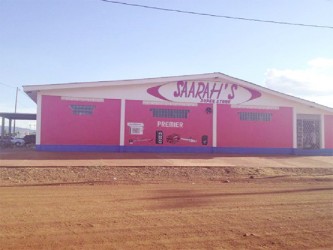Shaan Deen has been operating a business enterprise at Lethem for the better part of five years, comprising a general store and a hardware store on Barrack Retreat.
Deen, 31, has more or less taken over the reins of the business from his father Idris Deen. The Deens hail from Montrose, East Coast Demerara and it is there that their excursion into business started, with the elder Deen importing confectionery and other items from Brazil and trading in the city.
The Deens relocated to Lethem in 1997 from which vantage point they continue to import goods from Brazil, across the Takutu Bridge and to transport goods from Georgetown. Their market for some of the goods that come from Georgetown is largely Brazilian; they come from across the border in droves. Setting aside the much smaller market in Lethem itself there are the Rupununi Amerindian communities some members of which travel to Lethem from as far away as Gunn’s Strip. The journey can take up to in excess of a week and for some of the Amerindians who make the journey, shopping means acquiring at least three months’ worth of supplies.

Over time Deen has acquired a sophisticated understanding of the economy the complexities of which extend across borders into both Brazil and Venezuela. That is why, in his recent interview with Stabroek Business he chose to return to the subject of transforming Lethem into a duty-free zone that would allow for imports destined for Lethem to not attract duties. He said that unless this happens, Brazilians, by far the vast majority of the shoppers at Guyanese- owned stores in Lethem will take their patronage elsewhere – to Venezuela.
The Venezuelan economy may be less than robust at this time, but the policy of subsidies instituted by the late president Hugo Chavez still means that a wide range of goods can be bought there cheaper; so that the Brazilians who cross the Takutu River are now finding their way to Venezuela to do their shopping.
The evidence of a change in the focus of Brazilian patronage is already beginning to manifest itself. Deen says that just five years ago it was customary to see a “mad rush” of Brazilians crossing the Takutu Bridge to do their Christmas shopping in Lethem between October to December. “These days that has changed. We are already at the end of November and there is no longer any evidence of that rush. It’s like the beginning of the new year,” Deen said.
Price stability, the young businessman said is important for reasons that go beyond competing with Venezuela’s subsidised goods. Deen says Lethem’s business houses are also concerned about price stability given that fact that their customers include poor Amerindian communities.
Deen believes that the way to win the Brazilian market back is to hasten the pace of making Lethem a duty-free zone, an idea which he said had been mooted under the Jagdeo administration some years ago. Deen says that while the then president Bharrat Jagdeo did not appear to object to the idea, he had said then that mechanisms would have had to be put in place before the idea could be implemented. He has heard nothing of the idea since then. There is, he says, an air of uncertainty hanging over the business community in Lethem at this time.
Deen, like other business owners with whom Stabroek Business spoke at Lethem recently, says the area’s unreliable power supply is both a hindrance to the growth of existing Lethem businesses as well as a disincentive to further significant investment there. He says power outages which can last as long as 12 hours a day make the competitiveness issue even starker since every business house has to have a generator. He says the unreliable power supply being offered by the Lethem Power Company is almost certainly a function of the inability of the power plant to service growing commercial and residential communities at Lethem. “Electricity is a vexing issue here at Lethem,” Deen says.
The investment of the Deen family at Lethem coincided with Barrack Retreat being declared a commercial area. Deen sees the potential for business growth but wants to see a greater official focus on creating an enabling environment.





